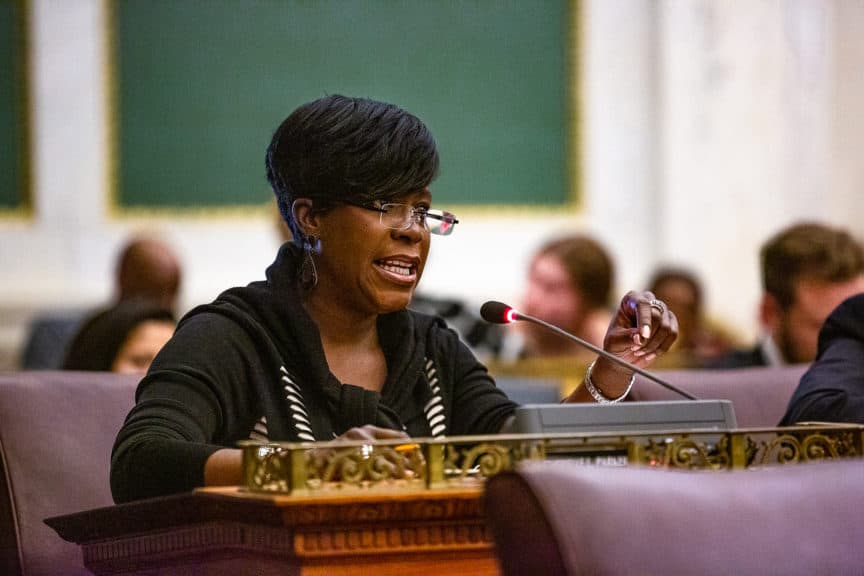PHILADELPHIA, PA, January 31, 2020 – As Philadelphia welcomes a new police commissioner and the contract with the Fraternal Order of Police expires on June 30, 2020, Councilwoman Cherelle Parker (9th District) yesterday introduced a resolution that would put a question on the November ballot finally giving voters a voice in eliminating unconstitutional stop and frisk.
“Never before have Philadelphia voters had a chance to formally voice their opinion on this very important and much-debated practice. Now is the perfect time,” Parker said. “While this is a complex issue, with decades of federal and state case law differentiating between constitutional and unconstitutional stops, I believe Philadelphia residents are ready to have a conversation about this subject and collectively share their opinion. Biased application of the law only serves to erode community trust, which ultimately makes it harder for law enforcement to do their jobs.”
The question would read as follows:
“Shall The Philadelphia Home Rule Charter be amended to call on the Police Department to eliminate the practice of unconstitutional stop and frisk, consistent with judicial precedent, meaning an officer must have reasonable suspicion that a person is engaged in criminal activity in order to stop that person, and, therefore, an officer cannot stop someone unlawfully because of their race, ethnicity, gender, sexuality, religious affiliation or expression, or other protected characteristic?”
In June 2011, the City of Philadelphia and the American Civil Liberties Union (ACLU) reached a settlement in Bailey, et al. v. City of Philadelphia, et al., a suit which alleged that thousands of people each year were illegally stopped, frisked, searched, and detained by the PPD as part of its stop-and-frisk policy. Pursuant to the settlement, the PPD now collects data on all stop and frisks and stores this information in an electronic database. It also provides officers with the necessary training and supervision relative to stop and frisk practices and establishes a monitoring system in which the police department, plaintiffs’ counsel, and an independent court-appointed monitor review and analyze the data.
The settlement agreement, which resulted in what is referred to as the Bailey consent decree, means that the City could be sanctioned if they fail to address the problem of unconstitutional stop and frisk. While the consent decree has helped reduce the number of stops, and has improved the quality of stops, data shows that there is still work to do in eliminating this practice.
“I fully support this proposed ordinance as the elimination of stops and frisks that are made without reasonable suspicion or which are racially biased should be a high priority of the Philadelphia Police Department,” said David Rudovsky, co-counsel with Paul Messing, Susan Lin and the ACLU in Bailey v. City of Philadelphia. “If we are to achieve fair and effective policing in Philadelphia, there must be trust between the community and the police; ensuring that pedestrians are not stopped for arbitrary reasons would be a significant step in improving this relationship.”
Attorney Michael Coard added: “I applaud Councilwoman Cherelle Parker for such a well-thought-out ballot question. While improvements have been made in reducing the number of unconstitutional stop and frisks, in large part thanks to the Bailey consent decree, the City still has a long way to go. This ballot question will give the residents of Philadelphia a collective voice on this very important issue.”
Philadelphia District Attorney Larry Krasner said: “As prosecutors, we see the destructive effects of illegal stop and frisk every day, whether it’s when a violent crime goes unsolved because of a lack of community trust in police, when a young person turns away from a career in law enforcement after being humiliated in an illegal stop and frisk, when a judge dismisses an otherwise strong case because key witnesses are too frightened to testify, or when key evidence is suppressed because it was obtained during an illegal stop and frisk. The people who elected me in historic numbers three years ago reject the lie that they can have safety, or they can have freedom, but they cannot have both.”
Research also indicates there is no correlation between the elimination of stops and frisks and an increase in violent crime. In fact, when New York City radically cut back their use of stop-and-frisk policies in 2016 and 2017, decreases in crime continued.
“As part of an aggressive educational campaign, I look forward to working with all stakeholders, including but not limited to residents, the hard-working men and women of the Philadelphia Police Department who put their lives on the line daily, schools, community-based organizations, faith-based institutions and the legal community to ensure that all constituencies across the city understand this ballot question,” Parker said. “It is my hope that Philadelphia residents will clearly make their voices heard in calling on the Police Department to eliminate unconstitutional stop and frisk, and that our Police Department will use the outcome to bolster and further strengthen their resolve in continuing to root out this harmful practice,” Parker said.


